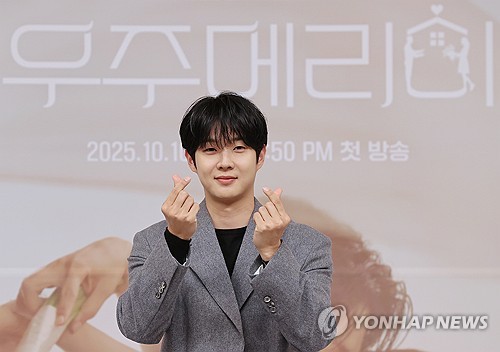Choi Wooshik and Jung So-min headline a 90-day marriage-of-convenience romcom.
The premise pits two people against each other as they compete for a luxury newlywed prize home.
Director Song Hyun-wook’s pacing and the actors’ variations are the main draws.
Viewers will tune in to watch how performances change and whether the setup feels fresh.
Is Choi Wooshik’s wealthy turn a bold variation or a safe retread?
Arriving in the fall lineup as a Friday–Saturday drama on SBS (one of South Korea’s major broadcasters), the series runs on the idea of a 90-day fake newlywed period.
The plot centers on the scramble over a premium starter home gifted as a prize.
Romantic comedy mood is the show’s anchor.
However, the real test will be the setup’s agility and the characters’ depth.
Choi Wooshik plays Kim Woo-ju, the fourth-generation heir to an 80-year-old patisserie, who also leads the company’s marketing team.
Jung So-min plays Yu Meri, who becomes the other axis of the story.
Their chemistry must deliver more than a simple meet-cute.
Notably, Choi’s character contrasts with the quieter, more anxious roles he has often played.

The clock ticks for 90 days.
Within that short span, a pretend marriage (a fake marriage for a specific purpose) forces conflict, reconciliation, growth, and choices.
Therefore, the storytelling must manage both pace and density.
Emotion needs to swing between believable realism and comedic lift.
History, definition, and genre context
Tracing the romcom line
Romantic comedies in Korean television typically blend light humor with emotional peaks.
Wooju Merimi borrows the familiar device of a fake marriage to build dramatic tension.
That device has produced many variations in the past.
Success depends on the finer points of plotting and characterization.
Song Hyun-wook directs.
His sensibility tends to emphasize rhythm in scenes and small shifts in an actor’s expression.
Looking at his previous work, he values tempo—balancing quick comic beats with quieter moments.
So his control of rhythm will likely be decisive here.
Analyzing Choi Wooshik’s character
Watching his transformation
Kim Woo-ju is rich on paper.
As heir to a long-standing bakery business, he carries public face and private responsibility.
As marketing team head, he is not a cartoonish tycoon; he negotiates company politics and brand image.
Thus, wealth is a dramatic motive as well as a source of conflict.
Choi’s résumé includes characters who are on the run or emotionally drained.
Here, he plays someone who actively designs situations and curates a public identity.
Compared with earlier parts, this role expands his range.
However, if the wealthy trappings remain surface-level, the actor’s scope will be limited.
Internal motivation must be clear.
Why does Kim Woo-ju enter a pretend newlywed arrangement?
What costs and benefits does he calculate?
And how do those calculations collide with real feeling?
At this intersection, script and performance must be tightly aligned.
Directorial work should ask for motivated action rather than merely reactive display.
Actor chemistry and performance synergy
Reading the pairing
Chemistry matters.
Yu Meri and Kim Woo-ju come from different emotional fabrics.
Jung So-min is known for precise domestic detail and subtle emotional shading.
Choi has a knack for revealing private anxiety alongside comic timing.
Their pairing could provide the tonal balance romcoms need.
Different acting styles may spark electricity or friction.
Thus, the director should stage scenes to highlight each performer’s strengths.
When rhythm aligns, dialogue flows naturally and emotion feels earned.
On the other hand, misaligned beats make jokes fall flat and sentiment feel forced.
Reasons for optimism
Where the show can succeed
The potential is real.
The cast alone can drive initial ratings and online conversation.
Both leads have dedicated fanbases that help early viewership.
Moreover, the romcom genre tends to keep a steady audience.
Performance variation is another asset.
A wealthy Choi Wooshik will contrast with his earlier roles and spark curiosity.
Freshness often translates to word-of-mouth.
If writers and director flesh out each character’s backstory and concrete motivations, that novelty will feel earned.
Narratively, a pretend marriage compresses relationship development.
Using the institution of marriage lets the story expose values and desires efficiently.
With the right mix of humor and tension, the show can deliver the pleasures romcom viewers expect.
Reasons for concern
Where the show could falter
Limitations are obvious.
The pretend-marriage setup is familiar.
Without imaginative variation, viewers may experience fatigue.
If the premise becomes a shortcut, empathy will fade.
Shallow character work is a risk.
If Choi’s wealth is only cosmetic, internal stakes will feel thin.
To justify his choices, the script must show responsibilities, anxieties, or isolation that come with privilege.
Also, romcoms can stumble on gender and social sensitivity.
If the pretend marriage reinforces stereotypes about women or domestic roles, criticism will follow.
Writers should treat family, work, and security with nuance.
Such nuance usually requires more than clever staging—it needs lived-in details in the script.
Comparisons and precedents
Learning from past titles
There are precedents.
Previous fake-marriage stories split into two camps: those that mined humor and believable growth, and those that exhausted the gimmick.
Wooju Merimi’s ultimate path remains open.
Past successes showed convincing inner change.
Failures depended on setup alone and ignored human motives.
This show must earn Kim Woo-ju and Yu Meri’s choices, and show how those choices reshape their work and home lives.
Directorial suggestions and the audience’s part
Practical notes for the production
Pace should be tuned.
Comedy lives on brisk timing and well-placed emotional pauses.
Key scenes should match music and camera rhythm to leave emotional aftertaste.
Also, small domestic details help sell a character’s life.
Audiences are more than passive buyers; they’re resonant communities.
Viewer feedback during a season can prompt mid-course adjustments.
Producers should watch early responses and consider careful tweaks if needed.

Conclusion and an open question
In conclusion, Wooju Merimi offers intriguing possibilities through its casting and premise.
Choi Wooshik’s wealthy role could broaden his acting palette.
Yet familiar plotting or thin characterization could undermine the effort.
Therefore, direction and writing must commit to believable motives and emotional layering.
The key points to watch are inner change in the characters and the actors’ chemistry.
Viewers will judge the show by the authenticity of performance and story.
Which elements do you think will make this romcom succeed?